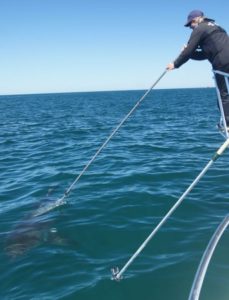
Skomal tagging a shark. Courtesy of the Atlantic White Shark Conservancy
HYANNIS – The shark research season has drawn to a close with 31 animals tagged with acoustic receivers—fewer than last year.
But shark researcher Dr. Greg Skomal said it was still another important step in understanding marine life just off the Cape’s coast.
The figure makes for 277 white sharks total and over 300 across the nation.
Skomal, who performs much of the tagging each summer, says the work the Atlantic White Shark Conservancy does is not only scientifically impactful, but is also vital to furthering coexistence with the animals widely recognized as top predators.
“Educate the public not only about the presence of these animals, but when they’re most likely to be there, what’s their seasonality, and where their locations are. Translating the science we’re collecting into public outreach opportunities is really what the Conservancy is all about,” said Skomal.
This research season saw the addition of aerial drones, which Skomal says may be able to better see shark behavior.
“The other thing we’re doing with drones is we’re trying to get a sense of how effective they might be as a tool to detect the presence of white sharks in an effort to provide an early warning system,” said Skomal.
He adds the idea is in its early stages, but more data will be necessary to see how such a system would perform in different weather conditions and water clarity.
The Atlantic White Shark Conservancy has been researching sharks seasonally since 2009, with peak months for shark activity being August through October.























